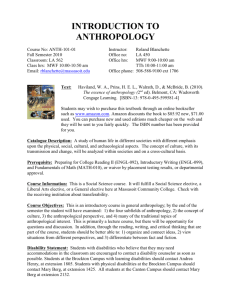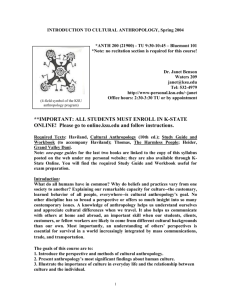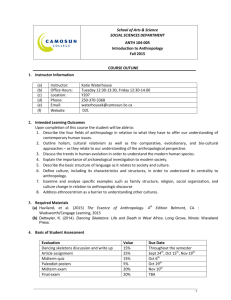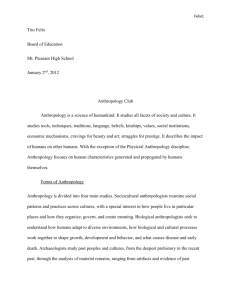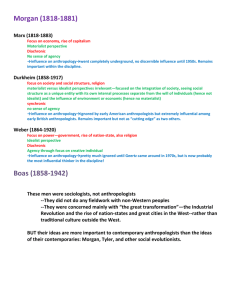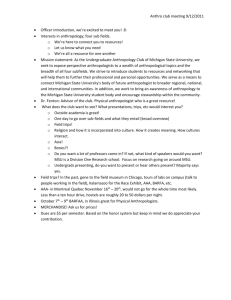Cultural Anthropology - Plymouth State University
advertisement
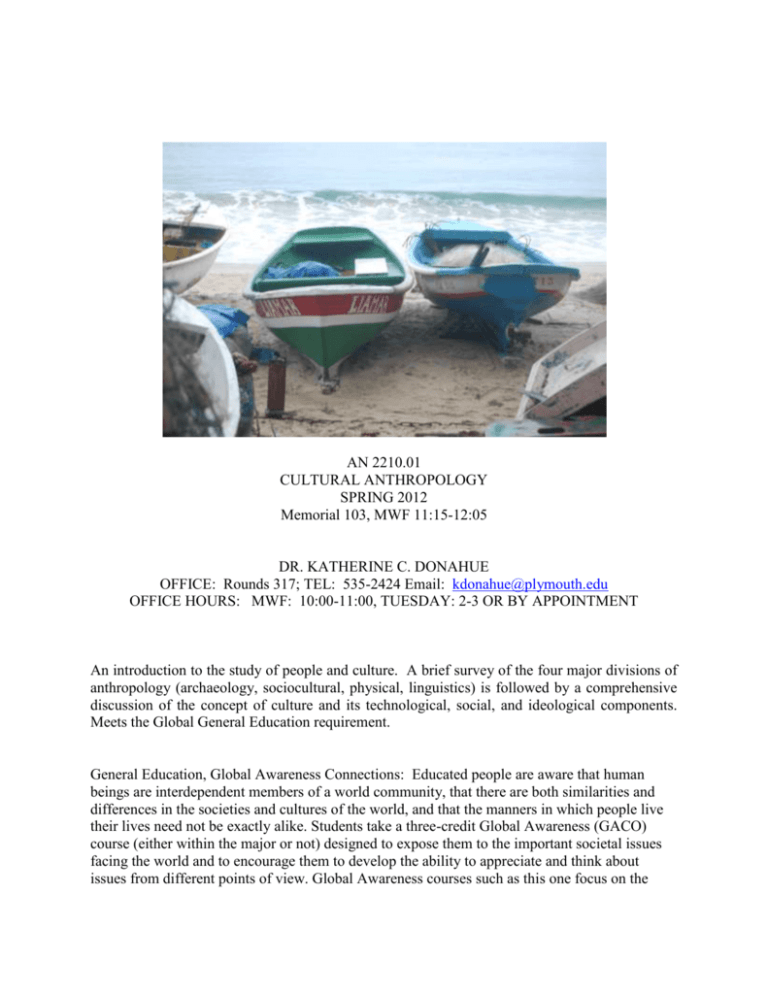
AN 2210.01 CULTURAL ANTHROPOLOGY SPRING 2012 Memorial 103, MWF 11:15-12:05 DR. KATHERINE C. DONAHUE OFFICE: Rounds 317; TEL: 535-2424 Email: kdonahue@plymouth.edu OFFICE HOURS: MWF: 10:00-11:00, TUESDAY: 2-3 OR BY APPOINTMENT An introduction to the study of people and culture. A brief survey of the four major divisions of anthropology (archaeology, sociocultural, physical, linguistics) is followed by a comprehensive discussion of the concept of culture and its technological, social, and ideological components. Meets the Global General Education requirement. General Education, Global Awareness Connections: Educated people are aware that human beings are interdependent members of a world community, that there are both similarities and differences in the societies and cultures of the world, and that the manners in which people live their lives need not be exactly alike. Students take a three-credit Global Awareness (GACO) course (either within the major or not) designed to expose them to the important societal issues facing the world and to encourage them to develop the ability to appreciate and think about issues from different points of view. Global Awareness courses such as this one focus on the forces that have shaped peoples, cultures, nations, and regions of the world. They increase students’ understanding of each person’s position, participation, obligations, and responsibilities within the world community. Course Objectives: Students in this course will: 1. demonstrate through written (papers and essays) and other assignments (observations captured through a variety of formats) an awareness of the wide range of global diversity of cultures and peoples. 2. apply critical thinking skills learned in the First-Year Seminar, to analyze, synthesize, to compare and contrast when using ethnographic materials to learn about different cultures. 3. learn and demonstrate through writing and presentations that cultures quite different from your own provide deeply satisfying ways of life for the people who share those cultures, and that values and norms, although widely similar in many parts of the world, can also be very different and yet morally and philosophically correct and normal for those people. This course may, therefore, challenge some of the assumptions you have about the way lives should be lived. Please Note: Plymouth State University is committed to providing students with documented disabilities equal access to all university programs and facilities. If you think you have a disability requiring accommodations, you should immediately contact the PASS Office in Lamson Library (5352270) to determine whether you are eligible for such accommodations. Academic accommodations will only be considered for students who have registered with the PASS Office. If you have a Letter of Accommodation for this course from the PASS Office, please provide the instructor with that information privately so that you and the instructor can review those accommodations. REQUIRED TEXTS: Haviland, William, et al., 13th ed. Other editions ok. Cultural Anthropology. NY: Thomson, Wadsworth (Cengage). ISBN: 978-0495810827. Ferraro, Gary. 2009. 3rd ed. Classic Readings in Cultural Anthropology. NY: Wadsworth. ISBN: 978-0495507369. Tucker, Catherine. 2010. Coffee Culture: Local Experiences, Global Connections. NY: Routledge. Supplementary film and Powerpoint will be used. Notes should be taken during all of this material since they are illustrative of material discussed in the texts and in lectures, and these notes will be useful in the essays you will be assigned. Class periods will consist of a combination of lectures and class discussion. We expect that you will have read the assigned chapters ahead of time. COURSE OUTLINE WEEK 1: 1/30-2/3 TOPIC What is Anthropology? Introduction to course; the fields of study; What is culture? READING Haviland, Ch. 1 Horace Miner in Ferraro, Article 1 Field observation: what interests you for a topic? (see separate handout) 2: 2/6-2/10 How do anthropologists do their work? Haviland, Ch. 2, 3 Friday, 2/10: Hand in discussion of Tucker, Ch. 1-3 Roger Keesing in Ferraro, Article your potential field observation topic 2 (where, what, specifically, will you observe?) 3: 2/13-2/17 4: 2/20-2/24 Why study physical anthropology? Human evolution? Primates? No class 2/15: Winter Carnival Haviland, Ch. 4 Language: Apes, Gender, Class and Cows What do these have in common? Haviland, Ch. 5 Deborah Tannen in Ferraro, Article 3 EXAM I FRIDAY 2/24 5: 2/27-3/2 Psychological Anthropology: How Do Haviland, Ch. 6 Humans Get to be That Way? Tucker: Ch. 4-6 Film: N!ai: The Story of a !Kung Bush Woman 6: 3/5-3/9 Subsistence: Food: Who Controls It? 7: 3/12-3/16 Economic Anthropology: How do things Haviland Ch. 8 get spread around? Tucker, Ch. 11-14 Who Produces It, Haviland, Ch. 7 Jared Diamond in Ferraro, Article 5 Tucker, Ch. 7-10 Friday, 3/9: Written report of field observation due EXAM II, Wednesday, 3/14 8: 3/19-3/23 No Classes; Spring Break 9: 3/26-3/30 Sex and Marriage and Families: Why is Haviland, Ch. 9 there some connection? Serena Nanda, in Ferraro, Article 7 Kinship and Class-based Societies: Do Haviland, Ch. 10 you have a second cousin? Does it Marjorie Shostak matter? Article 10 in Ferraro, Exercise: Who is in your household and family? 10: 4/2-4/6 Age, Gender, Common Interest Groups, Haviland, Ch. 11 and Class: What’s in a Potato Chip? Marjorie Shostak, in Ferraro, Article 10 EXAM III, Friday, 4/6 Presentations of field observations 11: 4/9-4/13 Political Organization; Big Men and State Formation: Is there a connection? Presentations of field observations Haviland, Ch. 12 James Gibbs, in Ferraro, Article 11 12: 4/16-4/20 Religion: Shamans and Healing: How do Haviland, Ch. 13 they do it? George Gmelch, in Ferraro, Article 14 Presentation of field observations 13: 4/23-4/27 Religion: Pantheons of Gods. What do Haviland, Ch. 13 they mean? 14: 4/30-5/4 Arts and Music: How do anthropologists Haviland, Ch. 14 study music? Inge Bolin, in Ferraro, Article16 15: 5/7-5/11 Why does genocide happen? What can Haviland, Ch. 15-16 we say about the future? Review Tucker, Ch. 15-18 FINAL EXAM: Wednesday, May 16, 11am-1:30pm, Memorial 103 POLICIES, etc. There is an attendance policy. You are expected to be in class, on time. We will take attendance according to the seating chart. If you are not in the seat you are signed in to, you are considered absent. If you have more than three absences, we will reserve the right to take up to ten points off your final grade. If you miss an exam or quiz for some reason, you will be responsible for arranging to take it at the time of the final exam. Class participation is important, and makes the class go much faster for you. Come to class prepared, and with questions. PAPERS, EXAMS, QUIZZES, etc. There will be four exams, weekly quizzes, writing assignments, and informal research reports, both in-class and out of class. You will be asked to do a field observation assignment (written version due Friday, 3/9; presentation sometime on weeks of 4/2-4/20) to learn techniques used by sociocultural anthropologists when doing field work. The assignment will require time spent observing interactions between people in a particular area, such as the HUB, or Monte Alto, or the post office, library, grocery store, ski area, garage, elementary school playground, etc. You will need to get permission in many instances, so we will discuss the ethics of observation. The paper will be 2-3 pages long. We will spend some time in class discussing ways in which anthropologists have conducted this type of assignment. All written work is, of course, to be your own. The quizzes will be graded by you (we will not keep those grades, but they can be used as a gauge for you to know about what you are learning or perhaps, need to spend more time reading). The exams will be a combination of multiple-choice and essay questions. EXAM I EXAM II EXAM III FINAL EXAM FIELD OBSERVATION PAPER PARTICIPATION (attendance, discussion, presentations, including of field observation) TOTAL 10% 20% 20% 20% 15% 15% 100%
